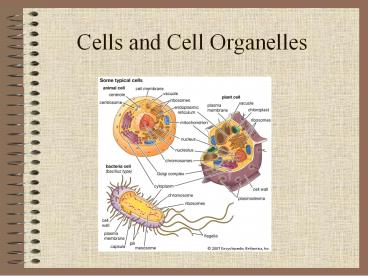Cells and Cell Organelles - PowerPoint PPT Presentation
1 / 21
Title:
Cells and Cell Organelles
Description:
... not living like the cell membrane ... worn out cell parts ... Arial Calibri Notebook 1_Notebook Cells and Cell Organelles History PowerPoint ... – PowerPoint PPT presentation
Number of Views:1444
Avg rating:3.0/5.0
Title: Cells and Cell Organelles
1
Cells and Cell Organelles
2
History
- Anton Van Leeuwenhoek
- The microscope was invented by Anton Van
Leeuwenhoek, a Dutch biologist in the early
1600s. Leeuwenhoeks invention allowed him to
see tiny living organisms in droplets of water.
3
- Robert Hooke was the first person to name cells.
- Hooke was looking at cork under the microscope
and thought they looked like the rooms monks
lived in called cells.
4
Over the next 300 years
Matthias Schleiden stated that all plants are
made of cells. (1838)Theodor Schwann
discovered that all animals are made of cells too
(1839).Rudolf Virchow stated that all cells
arise from the division of preexisting cells
(1855).
5
Cell Theory
Three key statements i. All
organisms are made up of one or more
cells. ii. The cell is the smallest living
organizational unit. iii. All cells are
produced from previously existing
cells.
6
2 type of cells
- Prokaryotic cells Eukaryotic
Cells
7
Prokaryotic cells
- Prokaryotic cells are . . .
- (1)Smaller and more primitive.
- (2)Have few organelles and their organelles have
no membranes. The cell has no nucleus. - (3)They are bacteria.
8
Eukaryotic Cells
- Eukraryotic Cells are..
- (1) More advanced, larger, and contain
organelles. These cells have a nucleus. Organisms
made of these cells include protists, fungi,
plants, and animals (including humans). - 2.Organelles allow many activities to take
place within the same cell other reactions take
place on membrane surfaces and eukaryotic cells
have much more internal membrane surface that
prokaryotic cells
9
Organization of Organisms
- Complex organisms can be organized as follow
- Organism
- Organs and organ
systems - Tissues
- Cells
- Organelles
- Molecules
10
Cell Membrane
- - contains special fat molecules which keep water
from passing through - - controls what comes into and goes out of the
cell - - also has proteins stuck in it
- very important for homeostasis
- Selectively permeable
11
Cell Wall
- - found in plants, bacteria, and fungi
- - not living like the cell membrane
- - because it is not living it requires pores for
things to get in and out. - - protects the plant cell and gives it strnegth
and structure - - because it is so strong the plant does not need
a skeleton
12
Cytoplasm
- Also known as cytosol
- all the liquid which fills the cell
- mostly water
13
Nucleus
- controls the activities of the cell
- contains the DNA (genetic information)
- DNA is in the form of chromosomes
- surrounded by the nuclear membrane which is
similar to the cell membrane - the nuclear membrane controls what goes in and
out of the nucleus
14
Mitochondria
- Site of cellular respiration
- release energy from the food we eat
- break down glucose and other molecules for energy
15
Ribosome
- Site of Protein Synthesis
- make protein for the cell
- most cells have 1000s of ribosomes
- some proteins stay inside the cell, some proteins
leave the cell
16
Lysosome
- - lysosomes break apart worn out cell parts
- - like a little recycling center
- the parts are then reused to make new cell parts
- Typically only found in animal cells
17
Chloroplasts
- - contain a green pigment called chlorophyll
- - this pigment absorbs light from the sun
- - the chloroplasts make glucose (the main food)
for the plant - - this process is called photosynthesis
18
Vacuole
- - the vacuole is used for storing things inside
the cell - - plant cells usually have very large vacuoles
that they use to store water - - the vacuoles of animal cells are not as large
but they have many more
19
Endoplasmic Reticulum
- Rough ER has ribosomes embedded in it
- Smooth ER has no ribosomes
- Functions in transport in the cell
20
Golgi Bodies
- Packages and Secretes proteins for use in the cell
21
Centrioles
- Only found in animal cell
- Function in cell reproduction































